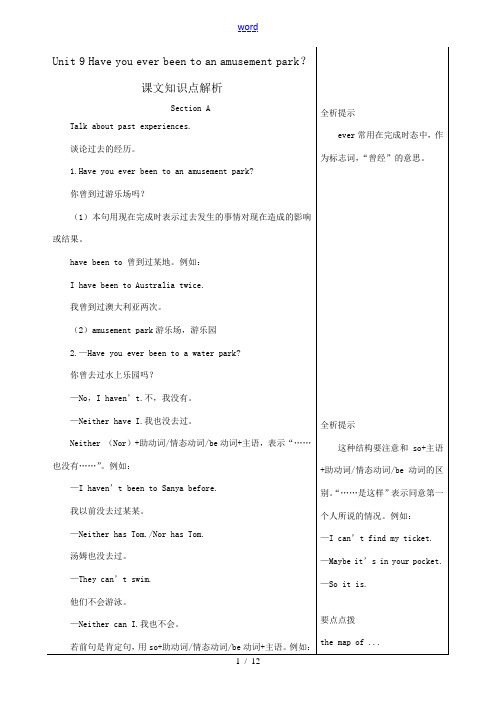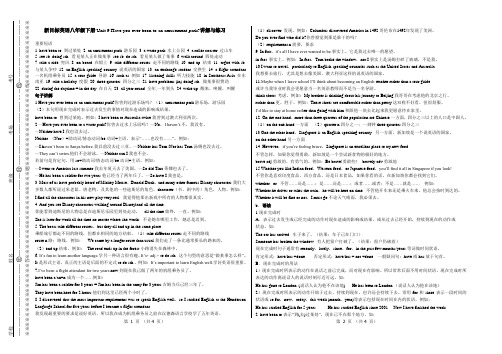八年级英语下册 Unit 9 Have you ever been to a museum Section A课时作业
- 格式:doc
- 大小:206.00 KB
- 文档页数:4

新目标八年级下册Unit 9 Have you ever been to a museum ?讲义一、重点单词1. amusement n. 娱乐; 游戏2. somewhere adv. 在某处; 到某处3. camera n. 照相机; 摄影机; 摄像机4. invention n. 发明物5. invent v. 发明; 创造1. unbelievable adj. 难以置信的; 不真实的2. progress n. 进步; 进展3. rapid adj. 迅速的; 快速的4. unusual adj. 特别的; 不寻常的5. toilet n. 坐便器; 厕所6. encourage v. 鼓励7. social adj. 社会的8. peaceful adj. 和平的; 安宁的9. performance n. 表演; 演出10. perfect adj. 完美的; 完全的11. itself pron.(it的反身代词) 它自己12. collect v. 收集; 采集13. German adj. 德国的; 德语的; 德国人的n. 德语; 德国人14. theme n. 主题15. ride n. 供乘骑的游乐设施; 短途旅程16. province n. 省份17. simply adv. 仅仅; 只; 不过18. fear v. & n. 害怕; 惧怕19. whether conj. 不管......;还是); 或者......(或者); 是否20. Indian adj.印度的 n. 印度人21. Japanese adj.;日本的; 日本人的; 日语的n. 日本人; 日语22. equator n. 赤道23. whenever conj. 在任何......时候; 无论何时24. spring n. 春天25. mostly adv. 主要地; 通常26. location n. 地点; 位置二、短语归纳1.at night在夜晚2.in a more natural environment在一个更加自然的环境中3.all year round 全年4.be far from 离……远5.in the dark 在黑暗中6.in the past 在过去7.have been to sp. 去过某地8.science museum 科学博物馆9.history museum 历史博物馆10.amusement park 游乐园11.go somewhere different 去不同的地方12.go skating 去滑冰13.take the subway 坐地铁14.a great way to spend a Saturday afternoon一个过周六下午的好方法15.all the old movie cameras所有的古老的电影摄影机16.learn about sth.解有关……的情况17.on the weekend 在周末18.camp in the mountains 在大山里露营19.put up a tent搭帐篷20.in such a rapid way 以如此迅猛的方式21.different kinds of各种各样的22.development of toilets 厕所的发展23.social groups 社会团体24.the tea art performances茶艺表演25.make a perfect cup of tea with beautiful tea sets用漂亮的茶具沏一杯完美的茶26.a nice place to enjoy tea 一个品茶的好地方27.thousands of 数以千计的28.International Museum of Toilets国际厕所博物馆29.the Terracotta Army 兵马俑30.Southeast Asia东南亚31.Night Safari 夜间动物园32.three quarters 四分之三33.an English-speaking country一个讲英语的国家34.have problem doing sth. 做某事很困难35.during the daytime在白天36.a couple of times 好几次37.right now 现在;目前38.an amusement park with a special theme一个有特别的主题的游乐园39.walk around the park 在公园里到处走40.hear of 听说41.take a ride兜风42.another province另一个省43.the Bird’s Nest鸟巢44.encourage sb. to do sth.鼓励某人做某事45.on the one hand... on the other hand.一方面,另一方面三、句型集萃1.a great way to do sth一个做某事的好办法2.It’s unbelievable that很难相信……3.watch sb do sth.看某人做了某事4.encourage sb to do sth鼓励某人做某事5.as..as和。


Unit 9 Have You Ever Been to an Amusement Park?一、学习目标:1.掌握现在完成时的用法;2.了解一般过去时、现在完成时和现在完成进行时的意义的区别;3.能够准确使用多种时态谈论自己的经历。
二、学习重点难点:1. 现在完成时由主语+have/has+过去分词构成。
其主要用法如下:I.在未指明具体时间的情况下,现在完成时动词通常可以表示在说话之前已经完成,而后果或影响至今仍存在的动作。
例如:The concert has started. 音乐会已经开始。
I have had breakfast. 我已吃过早饭。
注意:have gone to 和have been to 在意义上有区别。
例如:He has gone to Hong Kong. 他到某某去了。
(他已前往某某,或在途中,或已到达。
说话人暗示他现在不在现场。
)He has been to Hong Kong. 他曾到过某某。
(说话人认为他过去到过某某,现在已不在该地。
言外之意他对某某有所了解。
)II. 现在完成时动词可以表示开始于过去持续到现在(也许还会继续进行下去)的动作或状态。
例如:1) I have studied English since last year. 我从去年开始学习英语。
2) She has lived in Beijing for five years. 她住在已经五年了。
注意:e, go , leave, arrive, buy, lose, receive, join, die, bury 和marry 等动词所表示的动作是一时的,不能延续的,故不能与for …,since …等开头的表示一段时间的状语连用。
不过,这些词用于否定句则可以与表示持续的时间状语连用,即动作的不发生是可以持续的。
例如:不能说:*He has e to Beijing for two years.*He has bought that book for three weeks.*He has joined the Army for one and a half years.*His grandma has died for nine months.* I have received his letter for a month.可以说:He has been in Beijing for two years.He has had that book for three weeks.He has been in the army for one and a half years.His grandma has been dead for nine months.I haven't received his letter for almost a month.或者:It is two years since he came to Beijing.It is three weeks since he bought that book.It is one and a half years since he joined the Army.It is nine months since his grandma died.2. 现在完成时把过去的动作和现在的结果联系起来,一般过去时只限于表示过去的动作本身,与现在的结果无关。

2022年人教版英语八下Unit 9 Have you ever been to a museum?写作主题:talk about past experiences一,话题分析:本单元的话题是谈论过去发生的事件和经历,熟练掌握并使用现在完成时的用法。
话题主要是记述自己曾经到过的让自己印象深刻的地方,对自己这次经历,进行描述,表达自己对这次经历的感受。
重点考查学生以下能力:1.学习在记叙文中发表观点;2.使用现在完成时态;3.学会谈论自己过去的经历。
二,写作步骤:1.总分总结构。
短文通常分为三个部分:总------第一部分:开篇点题。
说出经历的名称。
分-------第二部分:介绍自己的经历。
(详细)总——第三部分:对经历的感受和体会。
2.人称:第一人称3.时态:一般现在时、一般过去时、现在完成时等。
三,词汇积累:1.have/has been to...曾去过某地2.ever曾经3.already已经4.favorite最喜欢的5.the first time首次6.be full of 充满7.space museum/history museum/art museum/water park/zoo/amusement park太空博物馆、历史博物馆、艺术博物馆、水上乐园8.fantastic精彩的9.want to go想去......10.by subway/plane/train/bike.....搭乘地铁、飞机、火车、自行车11.spend度过12.learn about学到有关......13.camp 露营14.put up a tent支起帐篷15.give up放弃16.important重要的17.learn...from从中学会18.try尝试19.the most interesting最有意思20.recently最近21.so...that如此.....那么22.decide to do决定去做某事23.be interested in...对.....感兴趣24.can’t wait to do等不及做某事25.must be一定26.uncommon不同寻常的27.in the future在未来28.try our best进我们最大的努力29.learn more about多学一些关于30. a good way to...做......的好方式31.thousands of成千上万32.full of feelings充满........感觉四,句型积累:1.I have ever been to....我曾经到过.....2.This is the first time I have been to....这是我第一次到....3.The place was very ...那个地方非常.....4.I went to there by train.我是坐火车去的。

第 1 页 (共4 页) 第 2 页 (共4 页)学校 姓名 班级 考场 考号---------------------------------○密------------------ -------------------○封----------------------------- -- --○线----------------------------※※※※※※※※※※※※※※※答※※※※※※※※※※※※※※※※※※题※※※※※※※※※※※※※※※※线※※※※※※※※※※※※※新目标英语八年级下册Unit 9 Have you ever been to an amusement park?讲解与练习重要短语1. have been to 到过某处2. an amusement park 游乐园3. a water park 水上公园4. a roller coaster 过山车5. see sb. doing sth. 看见某人正在做某事 see sb. do sth. 看见某人做了某事6. walk around 四处走动7. take a ride 兜风 8. on board 在船上 9. take different routes 走不同的路线 10. end up 结束 11. argue with sb. 与某人争吵 12. an English-speaking country 说英语的国家 13. an exchange student 交换生 14. a flight attendant 一名机组乘务员 15. a tour guide 导游 16. such as 例如 17. listening skills 听力技能 18. in Southeast Asia 在东南亚 19. take a holiday 度假 20. three quarters 四分之三 21. have problems (in) doing sth. 做某事很费劲 22. during the daytime = in the day 在白天 23. all year round 全年,一年到头 24. wake up 醒来,唤醒,叫醒 句子讲解1.Have you ever been to an amusement park?你曾到过游乐场吗?(1)amusement park 游乐场,游乐园 (2)本句用现在完成时表示过去发生的事情对现在造成的影响或结果。

Unit9 Have you ever been to a museum?一、重点词汇及拓展1. amusement n. 娱乐;游戏e.g. The old ladies played the games just for amusement.老太太们玩这个游戏只是为了取乐。
amuse v. 消遣,逗笑;使开心,使愉快amusing adj. 有趣的,好玩的,好笑的amused adj. 被逗乐的;感到好笑的2.amusement park 游乐场e.g. The amusement park is open from May through October.游乐园从五月到十月开放。
3.somewhere adv. 在何处;到某处pron. 某个地方e.g. Maybe the keys are somewhere in the dining room.也许钥匙在餐厅某个地方。
I need to find somewhere to stay tonight.我得找到今晚要住的地方。
4.camera n.照相机;摄影机;摄像机e.g. I heard your parents bought you a cameras as a gift.我听说你的父母亲给你买了一台照相机作为礼物。
5.invention n.发明;发明物e.g. Do you think mobile phone is a great invention?你认为手机是一个伟大的发明吗?6.invent v.发明;创造inventor n.发明家invention n.发明;发明物e.g. As we all know that Edison invented light bulb.我们都知道爱迪生发明了灯泡。
7. unbelievable adj. 难以置信的;不真实的unbelievably adv. 难以置信地;不真实地unbelievably bad/good 坏得/好得令人难以置信incredible adj. 难以置信的e.g. I still find this story both fascinating and unbelievable.我仍然觉得这个故事非常有趣和难以置信。
Unit 9 Have you ever been to a museum?Section A, 1bSarah:I’m bored, Claudia. Let’s do something interesting.克劳迪娅,我很无聊。
我们来做些有趣的事儿吧。
Claudia:Have you ever been to a science museum?你去过科学博物馆吗?Sarah:Yes, I have. I went to the National Science Museum last year. Have you ever been to a history museum?是的,去过。
我去年去了国家科学博物馆。
你去过历史博物馆吗?Claudia:No, I haven’t.没去过。
Sarah:Me neither. Let’s go to one tomorrow.我也没去过。
我们明天去吧。
Claudia:Well, that sounds good, but I’m not interested in history.额,听起来不错,但我对历史不感兴趣。
Sarah:Really? I didn’t know that. Well, how about the art museum? Have you been to the art museum?真的吗?我不知道。
那艺术博物馆怎么样?你去过艺术博物馆吗?Claudia:I’ve been to the art museum many times.我去过艺术博物馆很多次了。
Sarah:Me, too. But I’d like to go again. Hmm, let’s see…how about the nature museum?I’ve been there a few times.我也是,但我还想去。
嗯,我看看,自然博物馆怎么样?我去过几次。
河南省八年级英语下册Unit9Haveyoueverbeentoamuseum解题技巧总结单选题1、—Hi, Tom! _________ you ever _________ the Bird’s Nest?—Yes, I have. It’s fantastic.A.Have; been toB.Have; gone toC.Did; go to答案:A句意:——嗨!汤姆!你去过鸟巢吗?——是的,我去过。
那太棒了!考查现在完成时。
由答语“Yes, I have.”可知,问句用现在完成时,排除C项;have been to表示“曾经去过某地(现在已经回来了)”;have gone to表示“去了某地(还没有回来)”。
分析语境可知,此处是问“你曾经去过鸟巢吗?”,应用have been to。
故选A。
2、—Do you like English?—Yes, but I think__________ is a great challenge to learn the language well.A.thatB.thisC.it答案:C句意:——你喜欢英语么?——是的,但是我认为把语言学好是一种挑战。
考查代词。
that那个;this这个;it它。
think后是省略that的宾语从句,不定式“to learn the language well”是从句的真正的主语,此处用it做宾语从句的形式主语。
故选C。
3、— Peter, have you ever been to the English Corner?— Oh, yes. I ________ there to practice speaking once a week last term.A.wentB.goC.have goneD.will go答案:A句意:——彼得,你去过英语角吗?——哦,是的。
上学期我每周去一次那里练习口语。
考查一般过去时。
Unit 9 Have you ever been to an amusement park ?68页1.amusement [ u ] 娱乐、消遣an amusement park 游乐场Have you ever been to an amusement park? 你曾经去过一个游乐场吗?Fun Times Amusement Park 欢乐时光游乐场。
复习have been to 去过,回来了have gone to 去了,现在不在这里have been in 去了,还在那里2. neither① adj. pron 二者都不Neither answer is correctNeither of the answers is / are correct.Which do you like? Neither I think they’re both ugly.② adv. 也不I don’t know. Me neither. I don’t know, either.70页3. Disneyland 迪斯尼乐园(前无冠词)Have you ever been to Disneyland?In fact, there are now several different Disneyland amusement parks around the world. 事实上,现在世界上有好几处不同的迪斯尼游乐场。
around the world = all over the worldacross China = all over China4. Mickey Mouse 米老鼠5. Donald Duck 唐老鸭6. character①性格I know his character very well.②汉字Chinese characters③人物、角色famous characters from Chinese historyDisney characters 迪斯尼人物Mickey Mouse and Donald Duck are famous Disney characters.7. seen see的过去分词。
Unit 9 Have you ever been to a museum Section A
(20分钟50分)
Ⅰ. 根据句意及首字母或汉语提示完成单词(10分)
1. It is u that America Basketball Team lost the final game.
2. October 1st is an u day because it’s the birthday of China.
3. The Red Cross is a s group.
4. That is a (完美的)plan.
5. What’s the(主题)of the class meeting?
Ⅱ. 单项选择(5分)
1. —I have never enjoyed success in playing ping-pong.
—Me, .
A. neither
B. too
C. also
D. not
2. Mr. Li Paris. He Paris many times.
A. has been to; has been to
B. has gone to; has been in
C. has been to; has been in
D. has gone to; has been to
3. —Have you watched NBA games?
—Yes, I really enjoy them.
A. ever
B. still
C. yet
D. never
4. Her story encouraged us our best to help the poor.
A. do
B. done
C. to do
D. doing
5. These are from Berlin.
A. German
B. Germen
C. Germans
D. Germens
Ⅲ. 完成句子(10分)
1. 看篮球比赛和打篮球本身一样有趣。
Watching basketball games is________ __________ __________playing basketball __________.
2. 他的英语口语正在迅速进步。
His spoken English________ __________ in a way.
3. 我最近去了一些历史悠久的国家。
I________ __________ visited some countries with long history.
4. 集邮是我的爱好。
It is my hobby________ __________ stamps.
5. 我从未品尝过粤菜。
I________ __________ __________Guangdong food.
Ⅳ. 句型转换(10分)
1. Laura has been to Sydney many times. (改为一般疑问句)
Laura to Sydney many times?
2. Lily didn’t finish the work. I didn’t either. (改为同义句)
Lily didn’t finish the work. ________ __________.
3. Mary has ever travelled to China. (改为否定句)
Mary________ __________ travelled to China.
4. Henry has seen the film twice. (对画线部分提问)
________ __________ __________ has Henry seen the film?
5. Has Jane gone to the library? (作肯定回答)
, she .
Ⅴ. 阅读理解(15分)
Dear Li Ming,
I’ve been in England for two months now. I hope you don’t think
I have forgotten you. There are so many places to see and so many
things to do that I’ve not had much time to write letters.
I will soon be starting my studies at King’s College. So far
I’ve been learning about E ngland and British ways of living. I will
tell you about London. One great thing about it is that it has lots of books you can read and lots of pictures you can look at. I am sure you’ll be more interested to know what I think about the life here.
I find some of the customs(风俗)new and interesting. People here don’t shake hands as much as we do in Germany. During the first few weeks I was often surprised because people didn’t put out their hands when I met them. Men raise their hats to women but not to each other.
Yours,
Wang Gang 1. The writer came London from .
A. Germany
B. India
C. South Africa
D. America
2. The writer .
A. will come to England in two months
B. came to England just now
C. came to England two months ago
D. has never been to England
3. The writer has .
A. not written any letters
B. no time to write letters
C. a little time to write letters
D. much time to write letters
4. The writer came to England to .
A. make a living
B. study
C. learn about life there
D. learn British ways of living
5. The writer .
A. enjoys the life there
B. doesn’t like the life there at all
C. knows nothing about the life there
D. says nothing about the life there
答案解析
Ⅰ. 答案: 1. unbelievable 2. unusual 3. social 4. perfect 5. theme Ⅱ. 答案: 1~5. ADACC
Ⅲ. 答案: 1. as enjoyable as; itself 2. is progressing; rapid
3. have recently
4. to collect
5. have never tried
Ⅳ. 答案: 1. Has; been 2. Me neither 3. has never 4. How many times 5. Yes; has
Ⅴ.答案: 1~5. ACCBA。